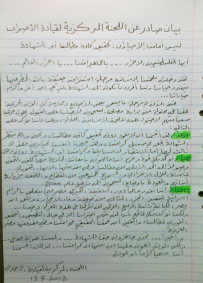Category: Press Releases
-
Volunteer in Gaza with the ISM
21 May 2012 | International Solidarity Movement, Gaza The International Solidarity Movement is appealing for activists to join our team in the besieged Gaza Strip. After being barred from Gaza in 2003 following the murders of Rachel Corrie and Tom Hurndall, ISM Gaza was reinstated in August 2008 when ISM and other volunteers traveled aboard…
-
Statement No. 7 of the Strike leadership
by The Central Committee of the Leadership of the Strike 13 May 2012 | Samidoun We have only two options: to achieve all of our demands, or to die Free Palestinian people, masses of our nation, free people of the world…. We have entered a stage of legendary and draining human struggle, where we face…
-
For immediate release: Cyclists attacked by soldier in the Jordan Valley seek legal action
17 April 2012 | International Solidarity Movement, West Bank For Immediate Release April 17, 2012: Cyclists attacked by soldier in the Jordan Valley seek legal action Danish activist Andreas was attacked by Israeli commander Lt.-Col. Shalom Eisner during an unarmed demonstration in the Jordan Valley on April 14th. (See video). Dutch activist Mira and a…

